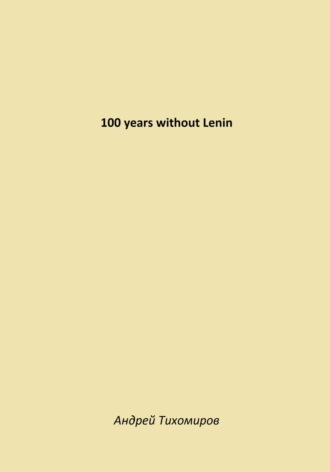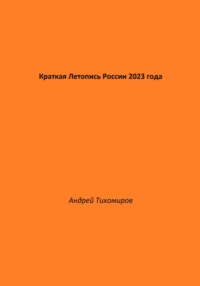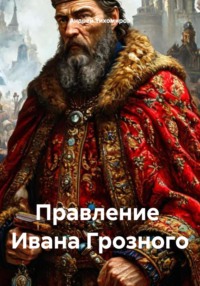
Полная версия
100 years without Lenin

Андрей Тихомиров
100 years without Lenin
The formation of Lenin as a revolutionary
Lenin (Ulyanov) was born in Simbirsk (Ulyanovsk) in the family of an inspector of public schools, who received hereditary nobility. Lenin's elder brother was executed (1887) for his participation in the assassination attempt on Tsar Alexander III. In the same year, Lenin entered the law faculty of Kazan University; in December, he was expelled from the university and expelled for participating in the student movement. In 1891, he passed the exams for the Faculty of Law at St. Petersburg University; assistant attorney at Law in Samara. In 1893 he moved to St. Petersburg. In 1895 He participated in the creation of the St. Petersburg "Union of Struggle for the Liberation of the Working Class", then was arrested. In 1897, he was exiled for 3 years to the village of Shushenskoye in the Yenisei province. In 1900, he went abroad; together with G. V. Plekhanov and other revolutionaries, he began publishing the newspaper Iskra. At the 2nd Congress of the RSDLP (1903) he headed the Bolshevik Party. Since 1905 in St. Petersburg; since December 1907 in exile. In April 1917, having arrived in Petrograd, he put forward in the April Theses a course for the victory of the socialist revolution. After the July crisis of 1917, he was in an illegal position. He headed the leadership of the October Uprising in Petrograd. At the 2nd All-Russian Congress of Soviets, he was elected Chairman of the Council of People's Commissars (SNK), at the same time (since 1918) Chairman of the Council of Workers' and Peasants' Defense; member of the All-Russian Central Executive Committee (VTSIK) and the Central Executive Committee of the USSR. He played a decisive role in the conclusion of the Brest Peace.On August 30, 1918, he was seriously wounded in an attempt on his life. In 1922, he became seriously ill and did not participate in political activities.
Lenin considered the creation of a party of professional revolutionaries, a "new type of party", to be the most important means of revolutionary struggle, unlike parliamentary social democratic parties, rejecting the concepts of E. Bernstein and K. Kautsky as reformist and revisionist, he concluded that capitalism had entered the last stage of its development – imperialism and the advanced countries of Europe were ripe for world socialist revolutions. Sharply criticizing the principles of parliamentary democracy and separation of powers, he defended the course of establishing the dictatorship of the proletariat as a tool for building socialism and communism. The dictator of the proletariat, in Marxism, is the designation of the power that is established as a result of the revolution carried out by the working class, led by its party.
Leninism is a political ideology developed by the Russian Marxist revolutionary Lenin, which proposes the establishment of a dictatorship of the proletariat led by a revolutionary vanguard party as a political prelude to the establishment of communism. Lenin's ideological contribution to Marxist ideology is linked to his theories about the party, imperialism, the state and revolution. The function of the vanguard Leninist Party is to provide the working class with the political consciousness (education and organization) and revolutionary leadership necessary to overthrow capitalism.
The revolutionary Leninist leadership is based on the Manifesto of the Communist Party (1848), which defines the Communist Party as the most advanced and decisive part of the parties of the working class of each country; the part that advances all others. As an avant-garde party, the Bolsheviks viewed history through the theoretical framework of dialectical materialism, which sanctioned a political commitment to successfully overthrow capitalism and then establish socialism; and, as a revolutionary national government, to make a socio-economic transition to socialism.
As a revolutionary practice, Leninism was originally neither a philosophy proper nor a separate political theory. Leninism includes the political and economic developments of orthodox Marxism and Leninist interpretations of Marxism, which function as a pragmatic synthesis for practical application to the real conditions (political, social, economic) of the society of Imperial Russia at the beginning of the 20th century. As a political science term, Lenin's theory of the proletarian revolution came into use at the 5th Congress of the Communist International (1924), when Grigory Zinoviev used the term Leninism to refer to the "revolution of the avant-garde party." Leninism was adopted as part of the vocabulary and doctrine of the Russian Communist Party (b) around 1922, and in January 1923, despite Lenin's objections, it entered the public lexicon.
In the 19th century, Karl Marx and Friedrich Engels wrote the Manifesto of the Communist Party (1848), in which they called for the political unification of the European working classes to achieve a communist revolution; and suggested that, since the socio-economic organization of communism has a higher form than that of capitalism, the workers' revolution would first occur in industrialized countries.
At the beginning of the 20th century, the socio-economic backwardness of Imperial Russia, characterized by combined and uneven economic development, contributed to rapid and intensive industrialization, which led to the creation of a unified working class of the proletariat in a predominantly agrarian society. Moreover, since industrialization was financed mainly by foreign capital, Imperial Russia did not have a revolutionary bourgeoisie with political and economic influence over workers and peasants, as it was during the French Revolution of the 18th century. Although Russia's political economy was agrarian and semi-feudal, the task of the democratic revolution fell to the urban industrial working class as the only social class capable of carrying out land reform and democratization, given that the Russian bourgeoisie would have suppressed any revolution.
In the April Theses (1917), the political strategy of the October Revolution (November 7-8, 1917), Lenin suggested that the Russian Revolution was not an isolated national event, but a fundamentally international event – the first socialist revolution in the world. Lenin's practical application of Marxism and the proletarian revolution to the social, political and economic conditions of agrarian Russia prompted the overthrow of the monarchy of the three-hundred-year-old dynasty of the House of Romanov (1613-1917).
In the book "Imperialism, the Highest Stage of Capitalism" (1916), Lenin's economic analysis showed that capitalism was being transformed into a global financial system through which industrialized countries would export financial capital to their colonies and thus exploit the labor of local residents and exploit the natural resources of their countries. Such overexploitation allows rich countries to maintain an internal labor aristocracy with a slightly higher standard of living than most workers, ensuring peaceful labor-capital relations in the capitalist homeland. Consequently, the proletarian revolution of workers and peasants could not take place in capitalist countries as long as the imperialist global financial system was preserved. The first proletarian revolution was to take place in an underdeveloped country such as Imperial Russia, the politically weakest country in the capitalist global financial system of the early 20th century. The revolutionary goal of the avant-garde Leninist Party is to establish the dictatorship of the proletariat with the support of the working class. The Communist Party will lead to the popular overthrow of the tsarist government, and then transfer state power to the working class; this change of the ruling class – from the bourgeoisie to the proletariat – makes it possible to establish socialism.
Lenin argued that the revolutionary vanguard party, recruited from the working class, should lead the political campaign, because this is the only way the proletariat will successfully carry out its revolution; unlike the economic campaign of the trade union struggle, which is advocated by other socialist political parties and anarcho-syndicalists. Like Marx, Lenin distinguished aspects of the revolution, the "economic campaign" (workers' strikes for higher wages and labor benefits), which was characterized by a scattered multiple leadership; and the "political campaign" (socialist changes in society), which required the resolute revolutionary leadership of the avant-garde Bolshevik Party.
Based on the First International (International Workers' Association, 1864-1876), Lenin organized the Bolsheviks as a democratically centralized vanguard party; in which freedom of political speech was recognized as legitimate until a political consensus was reached; subsequently, each member of the party was expected to adhere to an agreed policy. Democratic debate was a Bolshevik practice even after Lenin banned factions in the party in 1921. Despite his leading political influence, Lenin did not enjoy absolute power and constantly argued for his point of view to be accepted as a course of revolutionary action.
Before the October Revolution, despite supporting moderate political reforms, including Bolsheviks elected to the Duma when necessary, Lenin said that capitalism could only be overthrown by a proletarian revolution, and not by gradual reforms – from within (Fabianism) and from without (social democracy) – which would fail because control The bourgeoisie over the means of production determines the nature of political power in Russia. As embodied in the slogan "For the democratic dictatorship of the proletariat and peasantry", the proletarian revolution in underdeveloped Russia demanded that the united proletariat (peasants and industrial workers) successfully assume state power in the cities. In Bolshevik Russia, government based on direct democracy was carried out by soviets (elected soviets of workers), which, according to Lenin, were "the democratic dictatorship of the proletariat." The Bolshevik government nationalized industry and established a foreign trade monopoly in order to ensure the production coordination of the national economy and thus prevent the competition of Russia's national industries with each other. In order to feed the population of the city and village, Lenin created war communism (1918-1921) as a necessary condition – sufficient supplies of food and weapons – to fight the Civil War in Russia. In March 1921, the New Economic Policy (NEP, 1921-1929) allowed limited local capitalism (private trade) and replaced grain requisitions with an agricultural tax administered by state banks. The NEP was intended to resolve peasant riots due to food shortages and allowed limited private enterprise; the profit motive encouraged farmers to produce crops necessary to feed the city and countryside; and economically restore the urban working class, which had lost many workers in the fight against the counterrevolutionary civil war.
The Philosophy of Leninism
The philosophy of Leninism, which goes back to Marxism, is dialectical and historical materialism, which constitutes the worldview of the Communist parties. The philosophical teaching of Leninism represents the theoretical basis of its economic teaching.
Dialectical and historical materialism was created by K. Marx and F. Engels in the 40s, 19th century. on the basis of assimilation and critical processing from the standpoint of a new, revolutionary class – the proletariat, of all the best that had been created up to that time by human thought. The dialectical materialism of K. Marx and F. Engels is a product of the historical development of the sciences, including philosophy, over the previous period. He completes the more than two thousand-year history of the development of materialistic thought, representing a new, higher stage of materialism. K. Marko and F. Engels overcame the limitations and shortcomings of all previous materialism, including the French materialism of the 18th century and the materialism of L. Feuerbach, raising materialism to a new, higher level. Having accepted the main materialistic grain of L. Feuerbach's philosophy, they discarded its religious and ethical layers and developed materialism into an integral scientific and philosophical theory. K. Marx and F. Engels enriched materialist philosophy with his dialectical method, which was born as a result of a critical revision of Hegel's idealistic dialectic. Taking its "rational grain" from Hegel's dialectic, they freed dialectics from the snares of idealism and developed it further, creating a scientific method – materialistic dialectics – which is diametrically opposed to Hegel's method. Having extended the provisions of dialectical materialism to the study of social life, K. Marx and F. Engels developed a theory of historical materialism, which provided a scientific explanation of the history of human society and pointed out the ways of its revolutionary transformation.
The emergence of dialectical and historical materialism was a great revolutionary revolution in philosophy. The old philosophy was, as a rule, the teaching of loners, far from the people. The fundamental flaw of the preceding philosophy was its contemplation. Marxist philosophy is irreconcilably hostile to the dogmatism inherent in the former philosophy, which claimed to be the "science of sciences" standing above other spiders. The emergence of dialectical materialism put an end to philosophy in the old sense of the word. As the founders of Marxism noted, of the entire range of issues that the former philosophy dealt with, only the doctrine of thinking and its laws retained independent significance; everything else entered into the positive sciences of nature and society. Without pretending to replace these sciences, dialectical materialism studies those general questions that no science can do without solving: questions about the method of study, about the method of cognition of the phenomena of the objective world and the materialistic interpretation of these phenomena. The emergence of Marxism meant the emergence of a new, truly scientific philosophy based on the data of the sciences of nature and society and, in turn, equipping these sciences with the correct philosophical theory and research method. Dialectical materialism as the worldview of the Marxist-Leninist Party represents the unity of two inextricably linked sides: the dialectical method and the materialist theory.
K. Marx and F. Engels developed his materialist theory in the struggle against idealism, primarily the idealism of Hegel and the Young Hegelians. In the joint works of K. Marx and F. Engels' "The Holy Family" and "German Ideology", K. Marx's "Theses on Feuerbach" for the first time outlined the foundations of their dialectical-materialistic worldview. Later, for almost half a century, K. Marx and F. Engels developed materialism, moved it further forward, mercilessly rejecting, as V. I. put it. Lenin, as rubbish, nonsense, pompous pretentious nonsense, senseless attempts to "discover" a "new" line in philosophy, invent a "new" direction, etc. Materialistic theory develops on the basis of generalization of new scientific discoveries. After the death of F. Natural science made the greatest discoveries: it was found that atoms are not indivisible particles of matter, as they were represented by naturalists before, electrons were discovered and an electronic theory of the structure of matter was created, radioactivity and the possibility of atomic transformation were discovered, etc. There is a need for a philosophical generalization of these latest discoveries in natural science.
This task was accomplished by V. I. Lenin in his book "Materialism and Empirio-criticism" (1909). V. I. Lenin not only defended the theoretical and philosophical foundations of Marxism and gave a crushing rebuff to all kinds of opponents and "critics" of Marxism, but at the same time developed all the most important aspects of dialectical and historical materialism. V. I. Lenin's book provides a materialistic generalization of all the important and essential things that science, and above all natural science, acquired over a whole historical period. Thus, V. I. Lenin fulfilled the task of further developing materialistic philosophy in accordance with the new achievements of the sciences. By criticizing various directions of physical idealism, V. I. Lenin showed the inconsistency of the idealists' claims that "matter has disappeared." The latest discoveries in natural science, V. I. Lenin pointed out, do not refute, but, on the contrary, confirm the provisions of Marxist philosophical materialism about matter, motion, space and time. Only metaphysical materialism, which recognizes the existence of the last unchangeable particles of matter, has been refuted. But dialectical materialism has never stood and does not stand in the position of recognizing such unchangeable particles. V. I. Lenin stressed that the only "property" of matter associated with the recognition of materialism is its objective existence. In the struggle against the Machists, V. I. Lenin formulated the definition of matter as an objective reality that, acting on our senses, causes us sensations. V. I. Lenin stressed that the concept of matter is an extremely broad concept that covers everything that exists outside and independently of our consciousness. Idealistic attempts to detach movement from matter, to think of movement without matter, were subjected to scathing criticism by V. I. Lenin. Just as matter is unthinkable without motion, so motion is impossible without matter.
Конец ознакомительного фрагмента.
Текст предоставлен ООО «Литрес».
Прочитайте эту книгу целиком, купив полную легальную версию на Литрес.
Безопасно оплатить книгу можно банковской картой Visa, MasterCard, Maestro, со счета мобильного телефона, с платежного терминала, в салоне МТС или Связной, через PayPal, WebMoney, Яндекс.Деньги, QIWI Кошелек, бонусными картами или другим удобным Вам способом.









